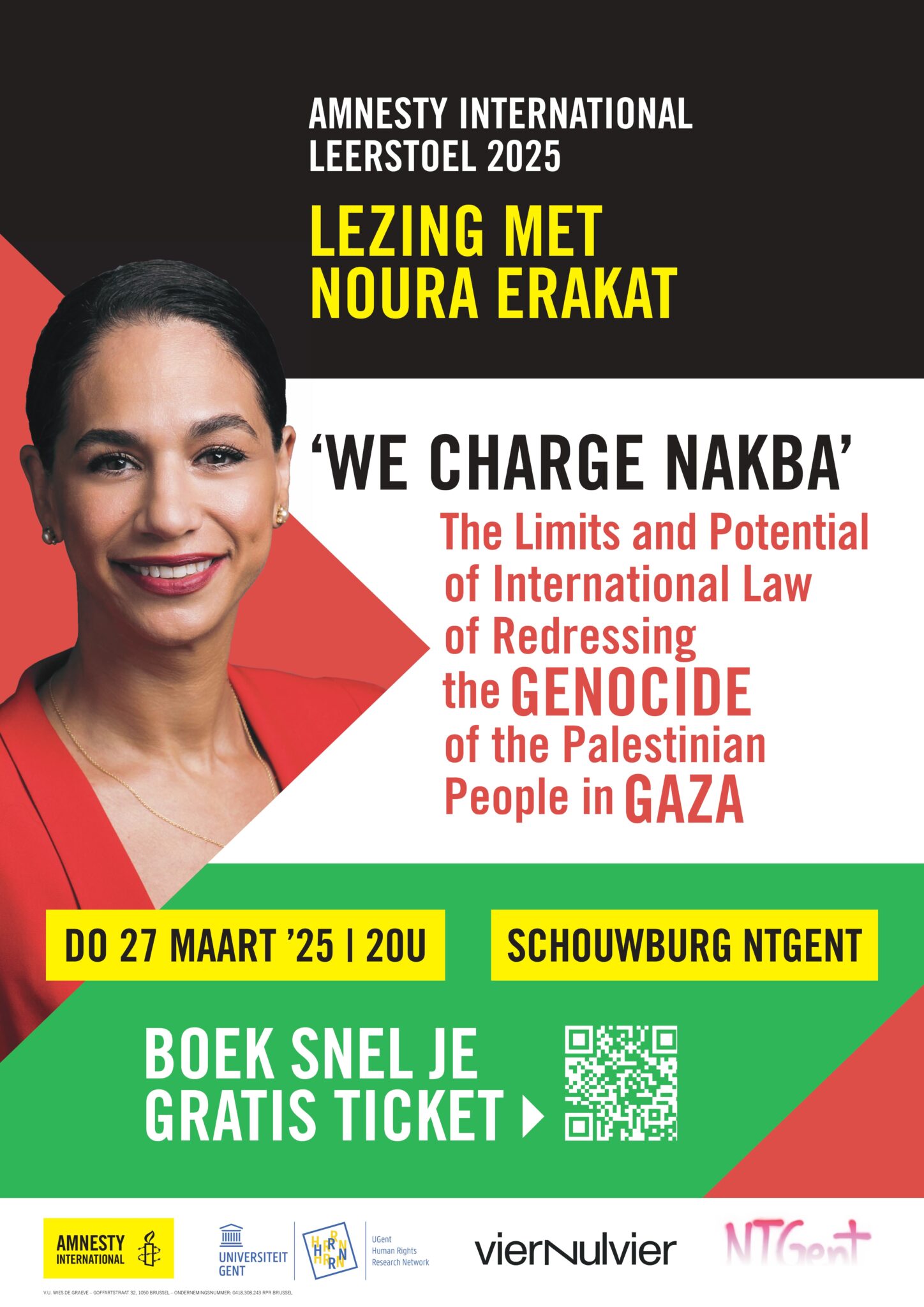We are delighted to report that Jadaliyya Co-Editor Noura Erakat is the recipient of the Ghent University's 2025 Amnesty International Chair Award for her critical academic evaluation of international law at the threshold of Palestinian liberation, titled We Charge Nakba: The Limits and Potential of International Law of Redressing the Genocide of the Palestinian People in Gaza.
This year laureate of the Amnesty International Chair is Noura Erakat, a prominent Palestinian lawyer and activist, whose courageous and relentless work as a human rights academic and attorney has reshaped legal and political discussions on the Israel-Palestinian conflict.
The ceremony will take place on the 27th of March at 20:00 at NTGent, Sint-Baafsplein 17, 9000 Gent.
→ CLICK HERE TO REGISTER

Who is Noura Erakat?
Noura Erakat is a human rights attorney and a Professor at Rutgers University, New Brunswick in the Department of Africana Studies and the Program in Criminal Justice. Her research interests include human rights law, humanitarian law, national security law, refugee law, social justice, and critical race theory. Noura is an editorial committee member of the Journal for Palestine Studies and a co-Founding Editor of Jadaliyya, an electronic magazine on the Middle East that combines scholarly expertise and local knowledge. She is the author of Justice for Some: Law and in the Question of Palestine (Stanford University Press, 2019).
Noura’s scholarly publications include: “Racism, whiteness, and burnout in antiracism movements: How white racial justice activists elevate burnout in racial justice activists of color in the United States” in Ethnicities; “New Imminence in the Time of Obama: The Impact of Targeted Killings on the Law of Self-Defense” in the Arizona Law Review; and “Overlapping Refugee Legal Regimes: Closing the Protection Gap During Secondary Forced Displacement,” in the Oxford Journal of International Refugee Law. Her multimedia productions include the Black Palestinian Solidarity video and website as well as the Gaza In Context Pedagogical Project, featuring a short documentary. A full list of her scholarly publications can be found here. Her current research seeks to examine the activist praxes in contemporary renewals of Black-Palestinian solidarity as well as technologies of surveillance and counter-surveillance in greater East Jerusalem.
Noura served as Legal Counsel for the Domestic Policy Subcommittee of the Oversight and Government Reform Committee in the House of Representatives from 2007-2009. Prior to her time on Capitol Hill, Noura received a New Voices Fellowship to work as the national grassroots organizer and legal advocate at the US Campaign to End the Israeli Occupation. Noura worked as the Legal Advocacy Coordinator for the Badil Center for Refugee and Residency Rights from 2010-2013. In that capacity, she drafted their submissions to the human rights treaty bodies and lobbied the US Congress as well as diplomatic missions at the United Nations on their behalf.
Noura has appeared on CBS News, CNN International with Becky Anderson, CNN with Don Lemon, MSNBC’s “Up With Chris Hayes,” “All In With Chris Hayes,” “Ronan Farrow Daily,” Fox’s “The O’ Reilly Factor,” NBC’s “Politically Incorrect,” PBS News Hour, NPR, BBC World Service, Democracy Now, and Al-Jazeera America, Arabic, and English. Her publications have appeared in The New York Times, The Washington Post, The LA Review of Books, The LA Times, The Nation, USA Today, The Hill, Foreign Policy, Jezebel, Al Ahram English, Al Shabaka, MERIP, Fair Observer, Middle East Eye, The Interdependent, IntLawGrrls, The Huffington Post, Al Jazeera, and Jadaliyya.
Noura earned her J.D. and undergraduate degrees from the University of California at Berkeley (Phi Beta Kappa) and a LLM in National Security from Georgetown University Law Center (Distinction & Dean’s List). She also earned a LLM in Legal Education by completing the Abraham L. Freedman Teaching Fellowship at Temple University, Beasley School of Law.
Public lecture
The public lecture and ceremony will take place on the 27th of March at 20:00 at NTGent, Sint-Baafsplein 17, 9000 Gent. The doors will open at 19:00.
We Charge Nakba: The Limits and Potential of International Law of Redressing the Genocide of the Palestinian People in Gaza
For fifteen months and counting, the only nuclear power in the Middle East waged a genocidal campaign against a besieged population who are predominantly refugees exiled from their homes still within eye’s view. Had international law been adequate to redress the condition of dispossession, exile, and torture, there would be no genocide today and Nakba would be a historical lesson rather than a source of contentious debate. Therefore, it should not be surprising that international law, including decisions issued from the International Court of Justice as well as arrest warrants requested from the International Criminal Court, have been unable to stem the gruesome, relentless slaughter. This lecture will attempt to address these conundra as well as the following questions: What explains this historic and contemporary insufficiency? How does the genocide in Gaza test the legitimacy, or lack thereof, of international law and legal institutions? Finally, what is the potential of existing legal frameworks and laws to meet this challenge?
Previously awarded
2024 – Joe Cannataci, UN Special Rapporteur on the right to privacy
2023 – Elizabeth Wathuti, Climate activist
2022 – Gloria Wekker, Social and cultural anthropologist
2021 – Adam Bodnar, Poland’s former ombudsman, and human rights commissioner
2019 – Geert Cappelaere, Children’s rights expert
2018 – Shirin Ebadi, Iranian human rights activist and Nobel laureate
2016 – Peter Piot, Renowned virologist and former UNAIDS director
2015 – Dave Eggers, American author
2014 – Clive Stafford Smith, Civil rights lawyer and anti-death penalty activist
2013 – Solange Habonimana, Burundian activist
2012 – Thomas Hammarberg as Commissioner for Human Rights in the Council of Europe
2011 – Sister Jeanne Devos who fights for the rights of domestic workers in India
2010 – Luis Moreno-Ocampo, Chief Prosecutor of the International Criminal Court
2009 – Nawal El Saadawi, feminist icon
2007 – Irene Khan, Amnesty International secretary